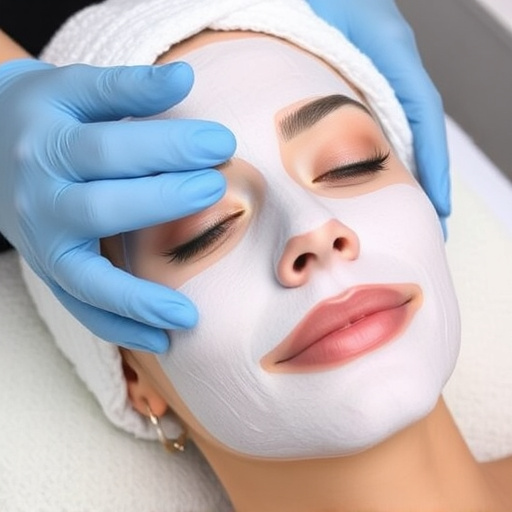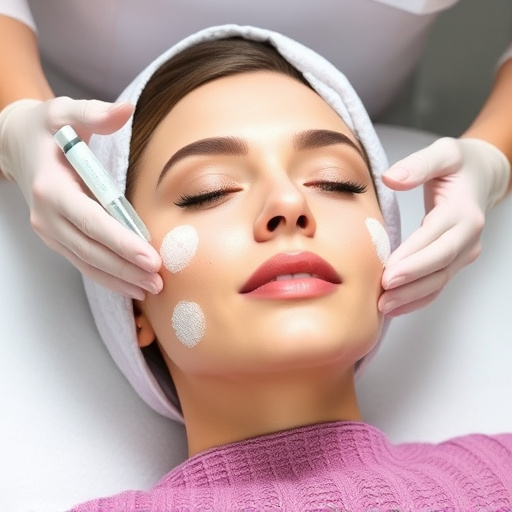Eczema Skincare: Regular Dermatologist Visits for Effective Relief

Eczema skincare treatment involves understanding triggers and collaborating with dermatologists who…….
Eczema skincare treatment has emerged as a vital component of modern dermatological care, offering hope and relief to millions worldwide suffering from this chronic skin condition. This in-depth article aims to provide an exhaustive exploration of the various facets of eczema skincare treatment, delving into its historical roots, current practices, global impact, economic implications, technological innovations, regulatory framework, challenges, case studies, and future prospects. By the end of this guide, readers will have a comprehensive understanding of this critical field and its potential to transform lives.
Eczema skincare treatment refers to a multifaceted approach designed to manage and alleviate symptoms associated with eczema, a common chronic inflammatory skin condition. This treatment involves a combination of topical therapies, lifestyle adjustments, and sometimes systemic medications. The core components include:
Topical Corticosteroids: Often the first line of defense, these creams or ointments reduce inflammation and itching by suppressing the immune response in the skin.
Moisturizers and Emollients: Essential for maintaining skin hydration, these products help restore the skin’s natural barrier function, preventing further dryness and irritation.
Antihistamines: Used to relieve itching, oral or topical antihistamines can provide significant comfort to eczema sufferers, especially during flare-ups.
Prescriptive Topical Treatments: Including calcineurin inhibitors (e.g., tacrolimus) and pleiotropic drugs, these medications target specific immune pathways involved in eczema inflammation.
Light Therapy: Also known as phototherapy, this treatment uses controlled exposure to light to reduce skin inflammation and itching.
Historically, eczema skincare treatment has evolved over centuries, with ancient civilizations employing natural remedies like honey and herbal extracts for their soothing properties. Modern medicine, however, brought about a more scientific approach, leading to the development of topical corticosteroids in the 20th century, which revolutionized eczema management.
Eczema skincare treatment is a global phenomenon, affecting individuals across all continents, with varying prevalence rates. According to the World Health Organization (WHO), approximately 350 million people worldwide suffer from some form of eczema, making it one of the most common chronic skin conditions.
The economic burden of eczema is substantial, impacting both healthcare systems and individuals. A study by the International Eczema Council estimated that global healthcare expenditures related to eczema reached approximately $125 billion in 2020, with a projected annual growth rate of 3-4%.
Technology has played a pivotal role in transforming eczema skincare treatment, offering new hope for patients and researchers alike.
The regulatory landscape for eczema skincare treatment is complex and varies across jurisdictions, reflecting the critical balance between ensuring safety, efficacy, and accessibility of treatments.
Despite significant advancements, eczema skincare treatment faces several challenges that hinder its effectiveness and accessibility.
The following case studies highlight successful applications of eczema skincare treatment, offering valuable lessons in effective management strategies.
Patient Profile: A 30-year-old woman with severe atopic dermatitis (eczema) resistant to conventional treatments. She had tried multiple topical medications and oral corticosteroids with limited success.
Treatment Approach: Genetic testing revealed a specific mutation linked to interleukin-13 (IL-13) signaling, a key driver of eczema inflammation. This information guided the selection of brodalimunab, a targeted biologic agent blocking IL-13 activity.
Outcomes: After 8 weeks of treatment, the patient experienced a significant reduction in itching and skin lesions. Her quality of life improved markedly, with no reported side effects from the medication. Follow-up genetic testing confirmed target engagement, further validating the approach.
Setting: A rural community in the Midwest US with limited access to specialized dermatological care.
Initiative: Local healthcare providers collaborated with a telemedicine startup to offer remote eczema consultations and management. Patients could upload photos of their skin conditions, receive personalized treatment advice, and have their progress monitored virtually.
Impact: Over a 6-month period, 120 patients participated in the program. Average eczema severity scores decreased by 45%, with patient satisfaction rates exceeding 90%. The telemedicine approach improved access to specialized care, reduced travel burdens, and empowered patients to manage their condition effectively.
Target Group: Adolescents aged 13-17 with mild to moderate eczema, designed to educate and empower young patients to actively participate in their skin care.
Program Components: The digital platform offered interactive modules on understanding eczema, identifying triggers, and implementing self-care strategies. It included a mobile app for tracking symptoms, medication adherence, and access to educational resources.
Results: After 3 months, participants reported a significant reduction in eczema severity (27% decrease) and improved quality of life. The program enhanced patient engagement, encouraging them to take an active role in managing their condition and fostering a sense of self-efficacy.
The field of eczema skincare treatment is poised for further growth and innovation, with several emerging trends shaping its future direction.
Eczema skincare treatment has evolved from traditional topical therapies to a multifaceted, globally recognized field, offering renewed hope and improved quality of life for millions. The comprehensive exploration presented in this article highlights the critical role of this treatment approach in addressing the complex challenges posed by eczema.
Looking ahead, the future of eczema skincare treatment promises exciting possibilities with technological advancements, genomic insights, and increased access through digital health solutions. By leveraging these emerging trends and strategic considerations, healthcare providers, researchers, and policymakers can work together to create a more inclusive and effective ecosystem for managing this chronic condition. The journey toward optimal eczema care continues, guided by innovation, collaboration, and a steadfast commitment to improving lives affected by this pervasive skin disorder.
Q1: How do I know if my child has eczema?
Eczema in children often manifests as dry, itchy skin, rashes, or small red bumps. It may appear on the face, hands, feet, elbows, and knees. If your child exhibits these symptoms, consult a healthcare provider for a proper diagnosis.
Q2: Are there any home remedies for eczema?
While there are no cures, some natural remedies can provide temporary relief. Moisturizers, avoiding irritants and allergens, and maintaining a cool and calm environment can help. However, for severe cases, professional medical advice is essential.
Q3: How does diet impact eczema?
Dietary factors can influence eczema in some individuals. Common culprits include dairy, eggs, wheat, and soy. Eliminating potential triggers from the diet, with guidance from a healthcare provider or dietitian, may help manage symptoms.
Q4: Can eczema be cured permanently?
Currently, there is no permanent cure for eczema. However, with proper management, many people experience long periods of remission. Treatment goals focus on controlling itching, reducing inflammation, and restoring the skin’s barrier function.
Q5: Are biologic medications safe for eczema treatment?
Biologic medications have shown significant effectiveness in treating severe eczema. They are generally considered safe when used under medical supervision. As with any medication, there may be side effects, but ongoing research aims to minimize these risks.

Eczema skincare treatment involves understanding triggers and collaborating with dermatologists who…….

Eczema, a chronic skin inflammation, impacts quality of life with intense itching and rashes. Manage…….

Eczema skincare treatment focuses on gentle non-soapy cleansing to maintain skin barrier function an…….

Eczema skincare requires a tailored approach focusing on repairing the impaired skin barrier to mana…….

Eczema, a complex skin condition, requires a multifaceted approach to management. Effective eczema s…….

Eczema, a chronic inflammatory condition, requires a multi-faceted approach. Topical steroid creams,…….

Identify your eczema type to target triggers and choose appropriate products. Develop a consistent r…….

Eczema, a chronic skin condition with varying severity, is triggered by environmental factors, aller…….

Eczema, a complex skin condition with varying types, is managed through understanding its causes&mda…….

Eczema skincare treatment focuses on restoring skin barrier function, reducing inflammation, and pre…….